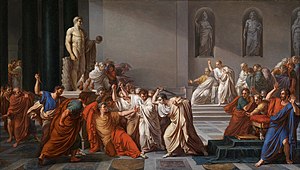
A person's last words, their final articulated words stated prior to death or as death approaches, are often recorded because of the decedent's fame, but sometimes because of interest in the statement itself. (People dying of illness are frequently inarticulate at the end,[1] and in such cases their actual last utterances may not be recorded or considered very important.) Last words may be recorded accurately, or, for a variety of reasons, may not. Reasons can include simple error or deliberate intent. Even if reported wrongly, putative last words can constitute an important part of the perceived historical records[2] or demonstration of cultural attitudes toward death at the time.[1]
Charles Darwin, for example, was reported to have disavowed his theory of evolution in favor of traditional religious faith at his death. This widely disseminated report served the interests of those who opposed Darwin's theory on religious grounds. However, the putative witness had not been at Darwin's deathbed or seen him at any time near the end of his life.[3]
Both Eastern and Western cultural traditions ascribe special significance to words uttered at or near death,[4] but the form and content of reported last words may depend on cultural context. There is a tradition in Hindu and Buddhist cultures of an expectation of a meaningful farewell statement; Zen monks by long custom are expected to compose a poem on the spot and recite it with their last breath. In Western culture particular attention has been paid to last words which demonstrate deathbed salvation – the repentance of sins and affirmation of faith.[3]
- ^ a b Erard, Michael (January 16, 2019). "What People Actually Say Before They Die". The Atlantic. Retrieved January 8, 2021.
- ^ Robin Winks, quoted at Arends, Brett (May 18, 2015). "Opinion: Piketty is wrong for the same reason 'Dow 36,000' was wrong". MarketWatch. Retrieved January 9, 2021.
- ^ a b Kastenbaum, Robert. "Last Words". Encyclopedia.com. Retrieved January 9, 2021.
- ^ Kastenbaum, Robert (April 1993). "Last Words". The Monist: Philosophical Aspects of Death and Dying. 76 (2): 270–290. doi:10.5840/monist199376214. JSTOR 27903337. Retrieved January 8, 2021.